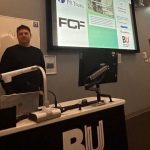 Produced by Guest blogger
Produced by Guest blogger

Hey guys, my name is JC. I’m from Canada and I’m currently doing a Master’s in Maritime Archaeology at Bournemouth University. Now I’m sure you are now picturing a mix between Indiana Jones and Jacque Cousteau. Well I’m about to burst your bubbles and I must apologize (I did say I was Canadian). There is so much more to Maritime Archaeology than diving wrecks; a lot of it entails research, not only after the wreck is found, but also to find its location.
Classes are adventures:
My course up to now has looked at the conservation of items found in water, by going to the York Archaeological Trust. We’ve looked at what is needed to undertake excavations, as well as the laws and acts that have been created to protect wreck sites. On top of our classes, we’ve also gone on fieldtrips to see the Fleet Air Arms Museum, the SS Great Britain, the HMS Victory – the most well-known shipwreck in England and the Mary Rose, the only surviving ship of King Henry VIII’s time, and others.

What’s next:
My next class will involve learning how to use the GIS program; this is a mapping program which archaeologists use to document the location of finds on a site.
There will also be a class about ancient ships, and a course where we are going to be able to get dirty. Yes, I said dirty, because Maritime Archaeology does not only mean wrecks where you need to scuba dive. Confused? Well, it also involves coasts and beaches as water levels are always changing with the tide. We don’t focus on the term ‘underwater’, but rather the finds, like ships (which can also be found buried on land), submarines, aeroplanes and tanks.










